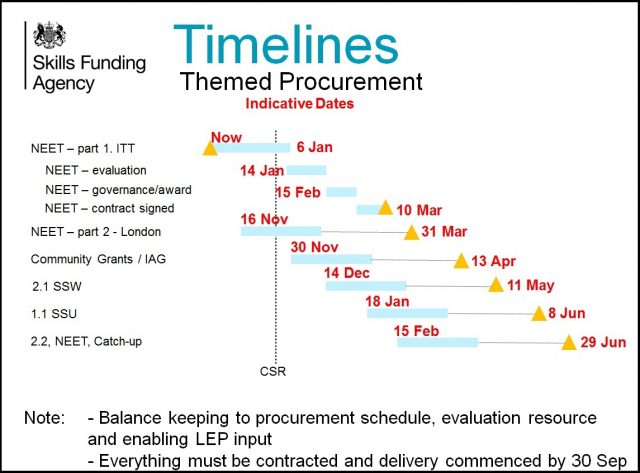Ten-point plan for apprenticeship success laid out by government official Jennifer Coupland
A ten-point plan to help deliver the government’s 3m apprenticeships target has been issued by senior apprenticeship official Jennifer Coupland (pictured above).
Ms Coupland, head of the Department for Business, Skills and Innovation (BIS) and Department for Education (DfE) apprenticeship unit, reeled off the points at a seminar themed ‘Where next for apprenticeships’ on Wednesday (November 11).
An audience of more than 300 delegates at the Westminster Employment Forum event listened to her discuss hitting the “huge” 3m target, but little detail was given on the apprenticeship levy with the spending review looming.
She said: “It [the target] actually means having more than one apprentice starting an apprenticeship every minute for the next five years — so that is quite a sobering thought.”
To tackle the target, Ms Coupland revealed her ten-point strategy to grow apprenticeship starts from “2.4m in the previous five years” to 3m by the end of this Parliament.

She said: “The first round of the strategy is all about quality.
“The key here is that we ought to take forward that we have started trailblazers — so putting employers in control of designing the standards that apprentices train against and the assessment plans that they will be assessed against to insure that they really are competent to do the job that they have been training to do.”
She then said the second was “employerrouted funding”, the third focused on “the public sector”, to encourage more apprenticeships, and the fourth strand was helping “small businesses”.
It was followed by the fifth strand which will be focused on engaging with “large businesses”.
The other strategy points listed for apprenticeship success were “marketing and communications”, “careers advice and guidance”, and “delivery of training and working with providers”.
She said: “This bit of the strategy is around the supply and delivery of training and working with providers, and getting FE colleges and training providers geared up so that they’re in a good position to offer the training that employers will want.”
A “steady state system of apprenticeship governance” and, having more focus on “degree and higher level apprenticeships” were the final points.
 She said: “If it works and we have come on the right track, I think we should have taken on 20 apprentices in the time that I have been speaking”.
She said: “If it works and we have come on the right track, I think we should have taken on 20 apprentices in the time that I have been speaking”.
Following Ms Coupland’s talk, Ofqual executive director for vocational qualifications Jeremy Benson discussed, among other issues, the “life cycle of qualifications”.
He said: “For a qualification to work effectively it needs to do more than to be well designed — it has to be delivered and it has to be kept under review.”
Mr Benson said: “Ofqual looks at what awarding organisations are doing and how they regulate.
“We don’t just look at the qualification, we look at all the other things as well.”
He added: “People often think our focus is up front on checking the qualification process, but we don’t rely on that being the only thing that is important.”
Outlining the ten-point plan
1. Quality
With reference to Trailblazers, Ms Coupland said this part of the strategy aims to put employers “in control of designing the standards that apprentices train against and the assessment plans that they will be assessed against” to ensure that apprentices are really competent in the job they have been training for.
She added: “The idea here is that if employers really value an apprenticeship programme, then more employers will come on board and offer apprenticeships.”
2. Funding
Full apprenticeship funding details will be announced in the upcoming Spending Review.
Ms Coupland said: “If employers have already invested in apprenticeships, we think many more will be wanting use the programme to get back what they’ve put in.”
She said that this money can then be used to generate useful training for people they want to employ.
3. Public sector
Ms Coupland said the government is “looking into measures to increase the public sector’s contribution to employing apprentices”.
She said the public sector employers around 1.7 per cent of their workforce as apprentices in comparison to the private sector which employ 2.3 per cent.
4. Small businesses
This strand of the strategy is about helping small businesses take on more apprentices.
Ms Coupland said teaching small businesses about how “easy to use tools” like Find an Apprenticeship can help “businesses fill their apprenticeship vacancies.”
5. Large businesses
Ms Coupland said: “We are also looking at large businesses and trying to make our strategy for engaging with very large companies much better.”
This will involve joining up with the cabinet office to make sure they are hearing a consistent set of messages about apprenticeships.
6. Marketing and communications
An efficient marketing and communications strategy to support the programme to generate more interest in apprenticeships is the next part of the strategy.
Ms Coupland said: “From research, it was interesting that parents were the main group who didn’t really understand types of things you can do as an apprentice.”
7. Careers advice and guidance
Ms Coupland said this strand is about good careers advice and guidance so “people are able to hear about apprenticeships and get the right information to make the right choices”.
The government will be working with enterprise advisers to spread the messages about the benefits of apprenticeships “successfully around”.
8. Delivery of training
Delivery of training and working with providers is the next part of the plan.
Ms Coupland said that this strand will aim to get FE colleges and training providers prepared so that “they are in a good position to offer training that employers will want” to expand programme take up numbers.
9. Steady state system
Ms Coupland said: “We are going to need a steady state system of apprenticeship governance.”
She said that after speaking to employers over the summer, they are quite keen that they move to a steady state set of arrangements where individual responsibilities are “very clear.”
10. Degree and higher level apprenticeships
To reach the 3m apprenticeship target, Ms Coupland said that “this does include growing more at the higher and degree level as a proportion of the overall programme”.
The government will be working with universities and other providers to develop higher apprenticeships to meet the needs of employers.
David Pollard, chair for education, skills and business support, FSB
Like father like son is a fitting phrase to sum up the first career step of David Pollard who followed the footsteps of dad Bert into the Royal Air Force.
At the age of 18, Pollard found himself applying for numerous jobs after leaving King James’s Grammar School in Huddersfield, but what he wanted most was a job that filled him with adrenaline.
The current Federation of Small Businesses (FSB) chair for education, skills and business support says: “My ambition when I was younger was to become a fighter pilot — which was the big thing at the time.”
He begins to smile and adds: “However they [RAF] said: ‘You’re slightly short-sighted, so you can’t be a pilot — but will you be an engineer?’ and, like a fool, I said yes.”
The aspiration to become a fighter pilot runs in the family and 68-year-old Pollard explains his father “would have loved to be a pilot also, but he lost an eye as a four-year old”.

So while Pollard senior compromised because of his eye sight and became a motor mechanic, Pollard junior’s career path ventured from engineering and lecturing to the FSB.
“My FSB chair post is not an elected one — for the more junior roles like this, we apply and go through a selection process and they appoint the appropriate people with the advice of the team. It’s voluntary and it’s unpaid,” explains Pollard, who got the chairjob two years ago.
He had joined the RAF in 1964 and carried out a degree in aeronautical engineering and management at the RAF College Cranwell in Lincolnshire.
Then he worked as an engineer for the RAF for six years where he served at a range of locations across the country. During this time he started to develop an interest in FE.
He says: “One of the things I remember as an 11-year-old was that my father started evening classes at the local technical college because he was a motor mechanic and he wanted to do something more.”
His father completed a higher national certificate in mechanical engineering to develop his career and Pollard also remembers one of his sergeants doing the same course when he was in the Air Force.
“The Air Force was very big on the training development of people, so that became a feature of my life and the jobs that I did,” says Pollard.
He then worked in Algeria for the construction company Bectel on a gas refraction plant and helped train the locals to be able to operate and maintain the plant.
Pollard says: “They were coming from a low education level and I worked closely with a lot of the young Algerian technicians and engineers who hadn’t got much experience.
“It was also good working on the development and educational side of things.”

and Pollard at a wedding in 2010
Pollard’s interest in training and FE began to grow and he had a variety of roles managing engineering companies, working as an assistant lecturer in higher education and FE providers, and being a consultant to numerous growing businesses.
The grandfather-of-one today “represents the interests and aspirations of small
businesses” via the FSB.
He carries out a combination of responsibilities which include working with young people through Young Enterprise as a business ambassador.
“The first part of the role is to lobby government to try and make sure that government policies in the education, skills and business support arena work for small businesses,” explains Pollard.
“I have been very active on the apprenticeship front, first with the steering group on the Jason Holt report on apprenticeships and SMEs, and then the Richard Review.
“I was in there with lots of other people, but standing up for small businesses and the reality of the world of small businesses, and being involved with the review of the trailblazer apprenticeship standards, and I’m on the apprenticeship stakeholder board, representing the interests of small businesses.
“So I’ve had a lot of discussion with government on things like funding of reformed apprenticeships and the co-investment side of things, and particularly when they were looking at all sorts of different routes for finance for collecting the co-investment bits.

years ago
“We put in a strong case of various routes were really going to be extremely disadvantageous to small businesses, and one of the consequences of that in government would quite likely be that a lot of small businesses would say: ‘This is a step too far – we can’t do it. We can’t pay out the full cost of the training and then hope that the bureaucracy or HMRC’s systems will deliver us the two-thirds that we’re entitled to before we have to pay all the bills’.”
Pollard also works as the director of a company in Hampshire called Southern Business Growth Network which is “trying to set up a network and create facilities to help people, to help businesses, and support people starting up a business”.
Pollard then draws attention to the City & Guilds ‘rich list’ that has named the wealthiest people who have done their apprenticeships.
The list includes a range of billionaires and millionaires like vacuum tycoon James Dyson (net worth £2.5bn) and TV chef and restaurateur Jamie Oliver (net worth £240m).
He explains that promoting the City & Guilds qualifications through the list was a great mechanism for gaining the attention of a range of people debating whether to study FE.
“Because it shows you can have a dream, have a job, build a business and grow it — and we need a similar sort of campaign now so people can see why, by doing an apprenticeship, they can get to the top,” he says.
Apprenticeships are key for Pollard, but he believes there is room for improvement.
Pollard says: “A footballer told me at a Referees’ Association meeting that ‘the difference between the continental players and the British players is the continental players go to the training ground on a Monday morning to train, but the British players go to be trained’.
“There’s a subtle difference there — a different mental attitude — and I think we’ve created that mental attitude in people.”

when he was in the Royal Air Force in 1964
Pollard recalls an unspecified meeting at which an ex-RAF sergeant made a comment about the high standard of staff in German banks, some of who had done financial service industry apprenticeships.
Pollard explains this could be down to the German apprenticeship being three years long and the English equivalent being one year long.
He says: “By the time you’ve had three years you have seen 70 per cent of what you are likely to get in the actual role — so you’re very competent at doing that job and you can be left alone to do it.
“Whereas we’ve got the idea that as long as we can throw a little bit at them [apprentices] and they can then quickly tell us that they’ve remembered what we’ve told them, then we’re competent.
“And it’s this difference between doing something because you’ve got a qualification and actually having the time to embed it and learn from some of your mistakes, to discover that you are really good and competent at the job.”
It’s a personal thing
What’s your favourite book and why?
I get things I get interested in and then I move on. But I like reading, I have done for years, and I like reading anything that’s really interesting and challenging. I am in the process of reading Keith Devlin’s book called Introduction to Mathematical Thinking
What do you do to switch off from work?
I pick up a book, get a glass of whisky and sit down, which is a nice way of relaxing. If it’s [wife] Jane and myself, then we will watch television together, like a murder mystery or a drama of some sort, and discuss it and spend an evening together
What’s your pet hate?

That people equate qualifications with skills, and competency, and we use this word ‘skills’ in a very loose way to mean several different things, which is confusing, because sometimes when politicians talk about skills, they mean qualifications and other times they mean competency
If you could invite anyone to a dinner party, living or dead, who would it be?
Douglas Bader, an ex Cranwell cadet like me, who lost both legs in a flying accident and left the RAF but returned at the start of the Second World War and was a fighter pilot during the Battle of Britain. The second one, on the same theme, is a guy called Captain Eric Winkle-Brown, who is a test pilot. The third person is Angus Deaton, the economist who has won the Nobel Memorial Prize for Economics. He’s very interesting, because he’s done a lot of work on economics, which is something I got into when I was in the Air Force
What did you want to be when you were growing up?
When I was a 16-year-old I wanted to be a fighter pilot, then a test pilot, then an astronaut. That was the dream career path
Thinking up a future for FE and skills
The FE and skills sector has never been more in need of clear-minded leadership and focus. Ayub Khan outlines how Fetl hopes to help develop such thinking.
There is no doubt that the FE & skills sector has reacted and to some extent adapted to the changes required of it by government.
Its strength in delivering basic skills — A-Levels, NVQs, foundation degrees, diplomas, apprenticeships, work-based training, and personal and community learning — is admirable.
I can testify to the good work of the sector having been a learner in FE after leaving school many years ago.
Yet for all of the wonderful things that the sector has delivered it is still poorly defined and understood.
It’s strength can be seen through its workforce, the practitioners who everyday serve its learners in all types of settings as well as its leadership that focuses on the daily pressures, navigating through each policy change and interpreting every page of the latest funding guidance. That’s is part of the sector’s DNA.
Yet there is something different required in the change the sector now needs.
The sector needs leadership that is able to look beyond the current crisis that engulfs it.
Thinking as a critical dimension of leadership too often gets squeezed out by the pressures of day to day management and delivery
In particular for FE colleges, the anxiety of focusing on area reviews means that the conversation will predictably lead to structures, jobs and funding. Yes, this is a difficult time, but it has always been so.
There are opportunities on the horizon if practitioners and leaders in FE and skills take time to reflect, think and be creative in response to the challenges the sector faces.
Thinking as a critical dimension of leadership too often gets squeezed out by the pressures of day to day management and delivery.
We need to support present and future leaders to think beyond immediate priorities and practice in order to shape the future — this is not just a place we are going to, it is a place we are actively making.
The sector has a chance to do this and there are opportunities to shape the future.
Take one example, Fetl fellowships. The programme offers a unique chance for practitioners and leaders to pursue a research interest that benefits FE and skills in the UK.
Fellowships take at least six months to complete, during which time fellows will be supported by a prestigious higher education research institution to develop work that will support change in the FE and skills sector.
The first cohort of Fetl fellows will publish their research at the Association of Colleges conference on Wednesday (November 18).
Applications are now open for the next round and the deadline is November 30. Fetl is not prescriptive on themes. This is about generating ideas to help shape the future.
There are also opportunities through the Fetl grant programme to help the sector think about its future. So far we have funded seven projects ranging from innovation in governance to identifying new leaders in the sector.
The research through these projects will provide another valuable source of evidence of what works and what could be applied to the sector.
There is no doubt that in times of austerity, the importance of organisations and individuals working together to make changes and meet the challenges ahead cannot and should not be underestimated.
Simply getting through the current crisis and carrying on as before will not be acceptable to learners, employers and the sector.
Yet the truth is, that despite the current difficulties, there is a new prize on the horizon. The prize that awaits the sector is one where we have true autonomy, institutions and providers working collegiately, yes inevitably leaner but so much more fit for purpose serving learners and helping employers.
A sector that is served by strong research and evidence and therefore better informed and understood by policy makers and individuals.
FE and skills needs a new vision and a new narrative to secure its place in the future.
To do this requires an environment where the leadership of thinking is second nature.
The opportunities through the Fetl fellowship and grant programmes will help.
London principal hit with first inadequate GFE college rating under new Ofsted inspection regime
London’s Stanmore College has been handed the ignominious honour of being the first general FE college to be branded inadequate under Ofsted’s new common inspection framework (Cif).
It slumped from requiring improvement in its previous inspection report in May last year, to the grade four result with principal Jacqui Mace (pictured below right) and her governors coming in for criticism.
Inspectors said they had not taken “swift and decisive action following the previous inspection and consequently the quality of provision declined further”.
She told FE Week that she would not be stepping down, and claimed the result would have been better under the old Cif, which was replaced in September.
However, Ms Mace said the 3,500-learner college, which has a current Skills Funding Agency (SFA) allocation of £2.1m, accepted the Ofsted grading.
“I think we would have got a better grade under the old Cif as we had self-assessed ourselves as requiring improvement — we think that we still require improvement,” said Ms Mace.
She added: “I’m here to provide some continuity for the Ofsted monitoring visits we’ll now get and the FE Commissioner inspection and then we’ll see what the best way forward is.”
The blow comes with college leaders having agreed to “explore closer collaboration” with grade two-rated Harrow College, which has an SFA allocation of £6.6m and is less than four miles away. It also comes with London’s post-16 education area review, in which the capital’s mayor Boris Johnson is expected to play a leading role, set to launch soon.
The deal, signed by Ms Mace and Harrow principal Pat Carvalho on October 22, states: “We believe that such collaboration could potentially provide a broad and inclusive offer, building on each college’s strengths while seeking to enhance education and training opportunities for students and employers in West London.”
Stanmore’s report was made up of six inadequate and one ‘requires improvement’ headline field ratings.
Among Ofsted’s criticisms were that managers “do not use data and information well enough to identify weaknesses and to intervene to bring about rapid improvement” and they “have an unrealistic view of the quality of teaching, learning and assessment because their evaluation of teaching focuses on what teachers do in lessons rather than on the progress that learners make”.
“Leaders have not yet implemented fully the principles of study programmes for learners aged 16 to 19,” inspectors added.
Just one strength was listed for the college, with learners benefiting from “very good welfare support that helps them to overcome the personal difficulties that they face in their everyday lives”.
Ms Mace said: “We’ve taken on board what Ofsted said and we’ve got w very rigorous action plan in place which we are following. We already feel that it’s making an impact.
“But we don’t necessarily agree with all the findings of Ofsted. We did feel that the whole process, the inspection process, in its new framework was extremely different from previous years and one of the things that we noticed very much was that they hardly carried out any lesson observations.
“I think only about three lesson observations, everything else all the teaching and learning was assessed through learning walks and they didn’t necessarily see a broad range of lessons — they kept going back to the same ones that they’d already seen.”
Ms Mace, who said she planned to retire this year, also described the nine-page Ofsted report as “very short”. The previous inspection report ran to 16 pages.
“It doesn’t really give Ofsted enough space to talk about the good things,” said Ms Mace.
Ofsted said it did not comment on individual inspection results.
Progress continues at previously-troubled Barnfield College with Ofsted praise after final monitoring visit
Ofsted has identified progress across all areas looked at in a third monitoring visit of previously-troubled Barnfield College.
Inspectors were at the Luton-based college last month to review performance in a number of areas, including teaching, learning and assessment; teaching and learning of English and maths in discrete classes and within subjects; quality and accuracy of self-assessment; arrangements for work experience; and collection of destination data to inform curriculum planning.
The college, hit with an inadequate rating a year ago and slated as having “no key strengths”, was noted as having made “reasonable progress” in each, and was even achieving “significant progress” in a sixth and final area of learner management.
It comes just weeks after FE Week reported how FE Commissioner Dr David Collins, who was sent in to the college first over its finances in January last year and then for a second time over the Ofsted grading, had ended his involvement at the college after a visit in July from his adviser that concluded all his recommendations had been achieved.
The adviser’s report, seen by FE Week, praised the college, which has more than 7,250 learners, for progress in “reviewing staff and removing those who are not willing to change the way they work” and notes that a new leadership team is in place “with a clear vision of where they want the outcomes to be”.
Principal Tim Eyton-Jones (pictured above) told FE Week: “We are very pleased with the results of the latest monitoring visit by Ofsted, they have picked up the many improvements that we have made, and witnessed the very real progress that our learners are experiencing.
“We are particularly proud that the improvement in behaviour and conduct of students has been recognised as ‘significant progress’.”
The areas reviewed by Ofsted were identified in its first monitoring visit report, published in February. The report of the second visit, in May, indicated reasonable progress in all but teaching and learning of English and maths in discrete classes and within subjects and arrangements for work experience.
But on the third monitoring inspection, Ofsted noted how attendance and punctuality were significantly better and managers had boosted their monitoring of students’ progress. They also saw several staff appointed to ‘advanced practitioner’ posts, although their impact was not yet clear.
The college was commended on the introduction of new performance management for teaching staff and the plans for professional development in the near future. The report also noted that English and maths had been overhauled and new staff been hired for the subjects.
Despite being generally positive, the report did highlight some points that still require work at the college, such as lesson planning, constructive feedback and progress in GCSE and functional English and mathematics sessions.
“There is still a lot of work left to do, and we will be maintaining current the pace of change until our transformation plan has been achieved,” said Mr Eyton-Jones.
EXCLUSIVE: SFA reveals ‘tight’ timetable for delayed £650m ESF launch
The Skills Funding Agency (SFA) today unveiled its “tight” timetable for handing out £650m of delayed European Social Fund (ESF) cash — with delivery completed in just 18 months, FE Week can exclusively reveal.
It is planning to run a “sequence of procurement” that must be finished by the end of September next year at the very latest to allow a minimum delivery period of 18 months.
The delivery period, up to March 2018, was determined with ministers unable to say that the SFA would oversee anything other than apprenticeships beyond then.
Mike Bell, SFA deputy director for localism policy implementation, wrote to Local Enterprise Partnership (Lep) and European Structural and Investment Fund (ESIF) committees today with details of the timeline.
It follows a summer in which ESF-funded providers were forced to lay off staff amid delays in issuing 2014-2020 contracts as the government sought to iron out regional devolution issues.
“Ministers have agreed that we cannot put in place contractual or match-funding arrangements beyond the point at which the SFA might cease to be accountable for the non-apprenticeship adult skills budget,” wrote Mr Bell, who said a new “simplified procurement initiation document” would help the process.
 “As a consequence, all ESF contracts will have to come to a close in March 2018.
“As a consequence, all ESF contracts will have to come to a close in March 2018.
“By closing the contracts at this time, the SFA will have enough time to accrue the necessary match-funding and gather the necessary data from providers to submit our claims to the European Social Fund Division (ESFD) by the summer of 2018.
“This will then give ESFD enough time to make claims to the European Commission before the end of 2018, triggering final audits in 2019.
“However, at the same time we are also aware that we are all under pressure to begin to spend the ESF following the late approval of the Operational Programme in order to avoid any future financial penalties.”
Mr Bell’s letter, which was leaked to FE Week, adds that Lep and ESIF committees could either “retain the current funding, targets and outcomes to be delivered within a two rather than a three-year period,” or the SFA would “reduce the funding and deliverables pro rata to fit the two-year period”.
“This option will not help meet the spend, targets and outcomes allocated for the period and as such is less favoured by the Managing Authority,” wrote Mr Bell.
He added: “We realise this will be disappointing to some of you but we are now in a position in which contracts must be closed at the end of the 2017 to 2018 financial year.
“The attached timeline shows the tight deadlines that we will have to meet so that all contracts are at least 18 months long.”
Business Secretary Sajid Javid ‘talks a good game’ says BIS select committee chair Iain Wright in apprenticeships clash
Business, Innovation and Skills Select Committee chair Iain Wright accused Business Secretary Sajid Javid (pictured above) of “talking a good game” as the pair clashed over apprenticeships today.
Mr Wright, who is currently overseeing six committee inquiries with at least half touching upon apprenticeships, raised the issue of programme starts with Mr Javid during business questions in the House of Commons today.
Mr Javid had already answered a number of questions on the subject, claiming that “more than 2.4m apprenticeship starts have been delivered in England since May 2010” and that there had been a “45 per cent increase in apprenticeships since 2010”.
But Mr Wright, whose inquiry on the government’s Productivity Plan is taking a detailed look at the proposed large employers’ levy, said: “The Secretary of State talks a good game, but the fact is that apprenticeship starts have dropped in every single year since 2011-12.

“The ambition for 3m new apprenticeship starts is commendable, but would he concede that, in the light of the uncertainty surrounding key policy aspects such as the apprenticeship levy, he is going to struggle to hit that target?”
Mr Javid said: “First, I must point out that there were more than 492,000 apprenticeship starts in 2014/15, which was up 50,000 on the previous year.
“The honourable Gentleman mentioned the apprenticeship levy, and I know that he and his Select Committee have done some work on this.
“I hope that he will acknowledge that that will be a way of ensuring proper funding for apprenticeships, not just for the quality but for the quantity too.”
Latest figures, from last month’s statistical first release, show that provisionally there were 492,700 apprentice starts in 2014/15. The final confirmed figure is expected later this month.
Final figures from previous years show there were 457,200 starts in 2010/11, then 520,600 in 2011/12 and 510,200 the following year after a 12-month minimum duration was introduced for apprenticeships in August 2012, before slumping further in 2013/14 to 440,400.
And although the combined figure, including last academic year, stands at 2.4m starts, former Business Secretary Vince Cable conceded in December that around one-in-four learners might not have qualified, and he accepted start figures included multiple starts per learner and, prior to August 2012, frameworks of less than 12 months’ duration.
Labour predicts four-in-ten colleges under threat from Conservative spending plans
Four-in-ten sixth form colleges and GFE colleges could close under Conservative spending plans, Labour said new House of Commons Library research showed.
It revealed the budget for FE colleges could fall by at least £1.6bn under Government spending plans — the equivalent of four-in-ten FE colleges, it was claimed.
Labour’s education team arrived at the figures, a party spokesperson said, after working with the House of Commons Library to predict how Department for Education savings of 25 per cent and 40 per cent, as requested by Chancellor George Osborne, might be realised within unprotected budgets.
Shadow Education Secretary Lucy Powell (pictured above) said: “Before the last election, Labour committed to protecting the whole education budget from the early years to 19, because we value the entire journey of a child through education, including early years and post-16. Under the Tories, these areas face cuts, putting four-in-ten colleges under threat of closure.
“This country’s future success depends upon making sure every young person has the opportunities they need to fulfil their potential. At the moment, the Government’s narrow and backward-looking plan for education is simply not up to that task.”
David Batten, principal at Barrow-in-Furness Sixth Form College, said: “We have made many efficiency savings already; we have restructured management, increased workloads, cut non-pays costs, especially energy and have had to say goodbye to many good colleagues but we are getting to the point where the funding available for sixth form students, which is less than that available for a school pupil and far less than that for a university undergraduate, is simply not enough to offer a good education to students and to keep a small sixth form college running.”
A source close to Education Secretary Nicky Morgan dismissed the figures as “back of the fag packet nonsense” and “scare-mongering”.
It nevertheless comes amid the government’s programme of post-16 education area reviews. They have so far been announced for 83 general FE colleges and sixth form colleges in the West Yorkshire, Tees Valley, Sussex Coast, Solent, Birmingham and Solihull, Greater Manchester, and Sheffield city areas. The government has said the “need” to move towards “fewer, often larger, more resilient and efficient providers,” underlies the area reviews.
Martin Doel, chief executive of the Association of Colleges, said: “Investing in the high-quality education and training provided by sixth form and FE colleges is essential to help government tackle the skills challenges faced by this country and to promote social mobility.
“College budgets have been decimated in the last five years and the sector, as innovative and flexible as it is, simply cannot take more cuts.”
He added: “As the Spending Review approaches we would strongly urge the government to fund the education of our 16 to 18-year-olds at the same level provided for the education of 14 to 16-year-olds and ensure that adult skills training does not become a thing of the past.”
James Kewin, deputy chief executive of the Sixth Form Colleges’ Association said: “This is a deeply worrying report and confirms our fears that some sixth form colleges could be wiped from the educational map after the spending review.
“Funding for 16-19 year olds – already significantly lower than for younger students – has been cut three times since 2011, and it seems certain that further reductions will be made next year.”
When asked why Labour was sharing its analysis with the media for publication today, a party spokesperson said: “Because that’s the day we’ve decided to put it out.”
A government spokesperson said: “We have protected the schools budget and ended the unfair difference between post-16 schools and colleges by funding them per student, rather than discriminating between qualifications.
“We have provided sufficient funds for every full-time student to do a full timetable of courses regardless of institution.”
He added that the base rate of funding for 16 to 19-year-olds in the academic year 2015/16 would continue at the same level as in the academic year 2014/15: £4,000 for full-time 16 and 17-year-olds and £3,300 for full-time 18-year-olds.

